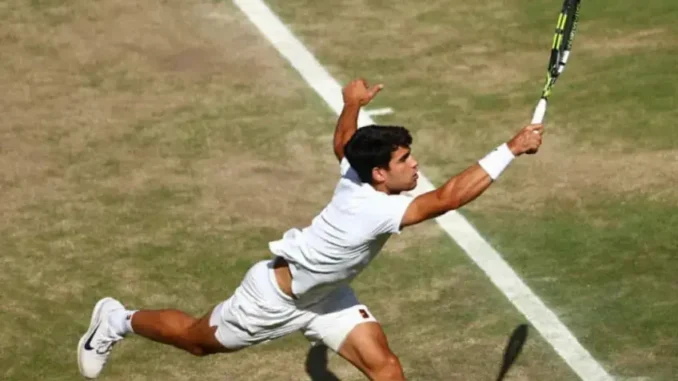
The 2025 Wimbledon Championships delivered a thrilling spectacle, but for Carlos Alcaraz, the dream of securing a third consecutive title on the hallowed grass courts of SW19 came to a crushing end. The 22-year-old Spanish sensation, a five-time Grand Slam champion, faced off against World No. 1 Jannik Sinner in a gripping final on July 13, 2025. Despite a valiant effort, Alcaraz fell 4-6, 6-4, 6-4, 6-4, ending his 20-match win streak at Wimbledon. The loss sparked a wave of analysis, with tennis legend Jimmy Connors delivering a pointed critique of Alcaraz’s on-court demeanor, questioning his mental resilience in a match that showcased both brilliance and vulnerability.
Alcaraz, who had not lost at Wimbledon since 2022, started strong, clinching the first set with a streak of four consecutive games. His signature flair—blistering groundstrokes, deft drop shots, and relentless court coverage—was on full display. However, Sinner’s aggressive baseline play and superior return game shifted the momentum. As the match progressed, Alcaraz’s frustration became evident, particularly in the third set when he was broken late. In a moment of candor, he shouted to his coaching box, “In the back of the court, he’s so much better than me,” an admission that caught the attention of fans and analysts alike. For Connors, a two-time Wimbledon champion and eight-time Grand Slam winner, this outburst was a red flag. “That is a tough thing to admit,” Connors said on his *Advantage Connors* podcast, co-hosted with his son Brett. “I don’t know if I would ever have admitted that. No matter what, you have to get in there, mix up your game a bit, or try and do something a bit different.”
Connors, known for his fiery competitiveness during his 1970s and 1980s heyday, didn’t hold back in critiquing Alcaraz’s approach. “His attitude is not acceptable in my opinion; he shouldn’t have had that behavior,” he stated. “He complained to his team and showed a weakness that he shouldn’t have flaunted at the time.” Connors argued that Alcaraz, trailing in the match, should have dug deeper for solutions rather than vocalizing his struggles. “If your plan A doesn’t work, you have to think about something else,” he added, reflecting on his own experiences in high-stakes Grand Slam finals. “I got my a** handed to me a couple of times at Wimbledon too. Everybody does. But if you are going to beat me, you are going to have to beat me.” His words underscored a belief that resilience and adaptability are non-negotiable at the elite level, especially in a Wimbledon final.
The critique wasn’t just about Alcaraz’s mid-match admission. Connors also raised eyebrows about the Spaniard’s pre-match routine, noting a moment before the final where Alcaraz was seen hugging seven or eight members of his entourage. “Your mum told me ‘get out there and play and let’s go home,’” Connors recalled, contrasting his own no-nonsense approach with the modern trend of large support teams. “I would have looked at that as a distraction,” he said, suggesting that such rituals might dilute focus in critical moments. For Connors, Sinner’s victory was a masterclass in focus and execution, particularly in his return game, where he won 36% of return points compared to Alcaraz’s 31%, hammering the Spaniard’s second serve with ruthless precision.
Despite the loss, Alcaraz’s 2025 season has been nothing short of remarkable. With titles at Rotterdam, Monte Carlo, Rome, the French Open, and Queen’s Club, he entered Wimbledon on a 24-match win streak. His versatility across surfaces—hard, clay, and grass—has solidified his status as a generational talent. However, Sinner, who also claimed the 2025 Australian Open, has emerged as a formidable rival, leading their head-to-head 4-3. Connors speculated on the psychological impact of Alcaraz’s admission, asking, “If he is admitting that in the finals of Wimbledon, what does that do for Sinner’s confidence for what is upcoming?” With the US Open looming on August 19, 2025, where Alcaraz is a former champion, the hard courts—faster, like Wimbledon—promise another intense chapter in this rivalry.
Alcaraz’s defeat marks his first loss in a Grand Slam final, ending a perfect 5-0 record in major finals. Yet, his youth and adaptability suggest this setback is merely a bump in the road. Connors’ critique, while sharp, reflects the high expectations placed on Alcaraz, whose explosive style and relentless energy have drawn comparisons to Rafael Nadal. As the tennis world shifts focus to the North American hard-court swing, Alcaraz’s ability to heed Connors’ advice—finding new strategies and maintaining mental toughness—will be key. For now, the Spaniard’s candid moment on Centre Court has sparked a broader conversation about resilience, leaving fans eager to see how he responds in New York.
Leave a Reply